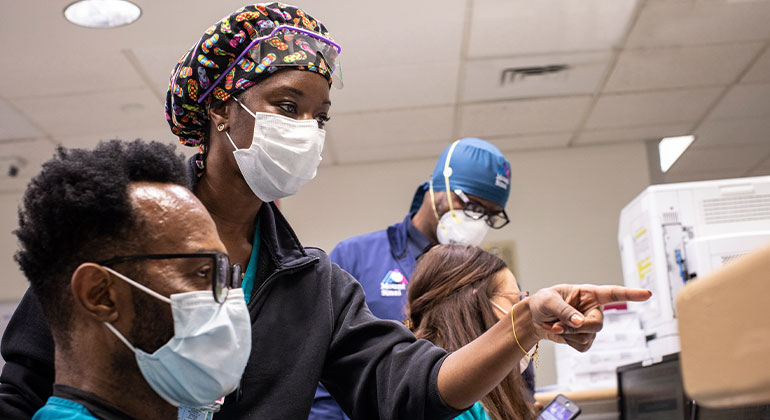
Emergency Department Nursing Fellowship
The front line of our front-liners is, without doubt, our Emergency Department. If you are looking to make an impact, the Mount Sinai Emergency Department Nursing Fellowship may be for you. Our health system is a microcosm of New York City itself—culturally, economically, and ethnically diverse. You will be prepared to handle a broad spectrum of acute patient needs, from cardiovascular emergencies to stroke to trauma.
Our 24-week program includes simulations, online modules, and hands-on training through clinical rotations. You will be paired with an experienced staff ED RN to help you build relationships, knowledge, and skills in the department and serve as a trusted resource. In addition, your career advancement and transition will be guided by our nurse preceptors, who provide focused training for skills and a wealth of experience.
Requirements
Candidates must have:
- Bachelor of Science in Nursing (BSN)
- Must have successfully passed the NCLEX before the cohort start date
- Satisfactory interview with a recommendation for hire from a Mount Sinai Health System manager
- Commitment for a 2 year work engagement
- GPA of 3.5 or higher
- A strong interest in a career path as an Emergency Department nurse
- A license to practice as an RN in the State of New York
- To learn more about the Fellowship, please email: Eileen.Silverman@mountsinai.org
How to Apply
We are continually seeking out committed nursing professionals who are passionate about making a difference at one of the most crucial times in our patients’ lives—in the Emergency Department. For more information, please email: Eileen.Silverman@mountsinai.org. Search for Fellowship postings on the Mount Sinai Careers page and apply.
Curriculum
For 2026, the Fellowship will be offered in March and August.
AHA BCLS required for all RN new hires, prior to orientation
From orientation through debriefing, our 24-week curriculum will prepare you for the demands of a fast-paced, high-performing emergency department.
New Beginnings/Central Nursing Orientation
Simulations of Basic ED Skills including:
- Oxygenation
- IV insertion
- Foley placement
- Medication administration
- Sepsis care
- Stroke
- STEMI
- Cardiac arrest
Cardiac Dysrhythmia Training
Life Support Certification: ACLS, PALS, and TNCC (Trauma) as applies
Emergency Room Orientation and Rotations
- Participants will serve 12-hour shifts
In-Patient Unit Training including:
- Ventilator care
- Wound care
- Tube feedings
Focused Simulations including:
- OBGYN
- Pediatrics
- Massive transfusion protocol
- Respiratory emergencies
Critical Care Unit Training including:
- Ventilator management
- Continuous infusions
- Care of the critically ill patient
Pediatric Unit Training
In-Person and Virtual Classes including:
- Stroke education
- Basic mechanical ventilation
- End-of-life care
- Behavioral health emergencies
- OB emergencies
- Pharmacy review
Non-Clinical Learning Opportunities
- Emotional intelligence
- Cultural sensitivity and anti-bias training
- Patient experience
Debriefing Opportunities including:
- Post simulations
- Clinical event reviews